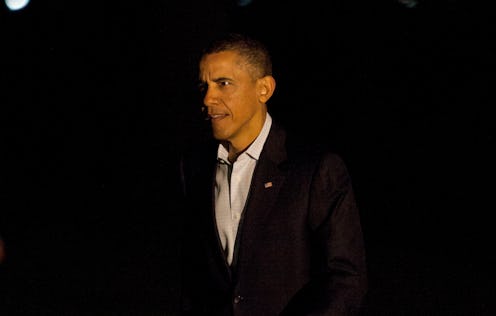News
Will Obama Have The Votes to Strike Syria?
President Obama's attempts to rally international support for a Syria strike at the G20 summit don't exactly seem to be working, as he reportedly met stiff opposition from numerous countries during discussions in St. Petersburg this week. The summit ended Friday without a consensus about what to do Syria.
Brazil, India, and Germany all warned against military action in the country. Pope Francis even wrote a letter opposing and intervention, and the president of the European Union said there would be "no military solution" to the civil war. These oppositions come in addition to those of Russia and China, who've stood by Syrian President Bashar al-Assad throughout the country's civil war.
The countries opposing the strike all urged the U.S. to work through the United Nations Security Council, despite the fact that Russia and China have, for two years, vetoed all attempts to take action against Assad through the UNSC. Samantha Power, U.S. ambassador to the U.N., addressed this at the Center For American Progress today, when she was asked why the U.S. isn't going through the Security Council.
“If we could, we would," Power said. "But we can’t.”
Regardless of what the international community says, the U.S. will likely launch a strike on Syria — if Congress approves. But will it approve?
That's the question political observers in the U.S. are feverishly attempting to answer. In the proud political tradition of trying to predict things way before they’re predictable, here’s an overview of where the votes stand at this point in time, and what they bode for the authorization's chances of success.
In the Senate, current whip counts — based on both public statements by Senators and a committee vote that’s already been taken — suggest that around 23 Senators would vote to authorize a military strike if the vote were held today, including eight Republicans and 15 Democrats. The pro-war coalition is diverse: It includes generally liberal Democrats like Al Franken, Barbara Boxer, and Dick Durbin, as well as conservative Republicans like Johnny Isakson and Saxby Chambliss. Senator John McCain also supports a strike, but he more or less always supports a military intervention (whether or not it’s been proposed).
Meanwhile, 15 Senators from both parties already oppose a strike, with another 10 leaning towards opposition. The anti-war coalition is maybe even more diverse here, as it contains liberal Democrats like Tom Udall, conservative Democrats like Joe Manchin, and super conservative Republicans like Ted Cruz and David Vitter.
That leaves a whopping 52 votes up for grabs. The Senate will probably need 60 votes to pass the resolution, pending an expected filibuster by Rand Paul, who never misses an opportunity to boost his profile for 2016. Majority Leader Harry Reid, who supports the bill, has predicted that he’ll be able to corral 60 votes in favor of the bill. (Whether he genuinely believes this or is attempting to make it a self-fulfilling prophecy is unclear at this point, but the speed with which the Foreign Relations committee passed the measure last week is at least a good sign for its chances in the full Senate.)
The House of Representatives will probably be the bigger lift. Current whip counts are all over the place: ABC says that 43 House members definitely or likely “yes” votes; The Hill puts that number at 31, while the Washington Post says it’s only 25. A lot of this depends on how you interpret public statements by the representatives themselves, as well as more subjective assessments of members' past voting tendencies. But no matter how you slice it, that's far below the 217 "yes" votes needed to pass. Tons of representatives have indicated that they’ll oppose the measure —anywhere between 71 and 106, with a ton of others implying that they’re leaning towards opposition.
Politico concluded yesterday that at most, 60 Republicans in the House might approve the measure, while Nancy Pelosi, who supports the measure, will be able to corral a maximum of 130 “yes” votes on the Democratic side. This would put the resolution at 190 votes — 27 short of passage.
This begs the question of what the Obama administration will do if the vote fails. Deputy National Security Advisor Tony Blinken told NPR today that while the president has the authority to strike no matter what Congress says, though it's “neither his desire nor his intention to use that authority absent Congress backing him.”
When Obama himself was asked to confirm Blinken’s comment later in the day, he attempted to walk it back, saying “I don’t think that’s exactly what [Blinken] said.” And thus, we’re back to total uncertainty as to what the administration will do if Congress votes down the war resolution.
As the military offensive waits in limbo, Obama and company are launching a PR offensive to convince America at large that striking Syria is the right thing to do. On Monday, the administration will brief the full House on the merits of a strike; the next day, Obama will make his case in a speech to the nation. The White House has also released a letter signed by 10 countries calling for a “strong international response” to the Syrian atrocities (not exactly a commitment to go to war, but hey, it’s something).
So basically, this entire thing is up in the air and, in the pantheon of U.S. politics, just about as far from a foregone conclusion as you can get.
